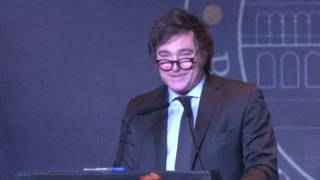
Outgoing Argentine President Carlos Menem last week vehemently rejected a Spanish judge’s attempt to prosecute members of the military junta responsible for Argentina’s “Dirty War.” Menem said that he will oppose all extradition requests, and will leave the conflict for the next government to deal with. President-elect Fernando de la Rua said that the Spanish warrants “have no practical effect” for Argentina because they order arrests outside national territory.
Judge Baltasar Garzn, who issued the arrest warrant last year against former Chilean dictator Augusto Pinochet, has indicted 98 former military officers on charges of genocide, terrorism and torture in connection with the dictatorship, which lasted from 1976 to 1983. The period became known as Argentina’s “Dirty War” — a reign of terror by a military junta that has been blamed for an estimated 10,000 to 30,000 deaths and disappearances, and the persecution of tens of thousands more, according to human rights organizations, Students, trade unionists, members of the left, peasants, human rights defenders — all were hunted down, imprisoned, disappeared, killed and tortured. Many of the disappeared were thrown from airplanes into the ocean while still alive; others were killed and buried in mass graves.
The regime blended a series of influences–from the ultra Catholic dictatorship of Spain’s Francisco Franco, to the Inquisition, to the Nazis, who were emulated with swastikas that were plastered on the walls of Argentine concentration camps. Even some key leadership in the Catholic Church allied itself with the regime and justified the killings and the torture.
Leading Argentine military officers had already been tried for some of these crimes, but they were pardoned by a 1990 amnesty issued by President Menem. However, some of the junta leaders are now being prosecuted thanks to a legal loophole: the amnesty failed to cover crimes involving the kidnapping of babies born to women who had been detained by the regime, and who were later killed. The children were generally given up for adoption to childless military families, and many have grown up ignorant about their origin and their real families.
The legacy of the “Dirty War” lives on today, over 20 years later–the Mothers and Grandmothers of the Plaza de Mayo still demonstrate once a week in Buenos Aires wearing their trademark white head scarves, carrying pictures of their disappeared loved ones and persistent in their call for justice. Forensic experts are still digging up graves and identifying the remains of those who were “disappeared.” And a group of women are still in search of their kidnapped grandchildren–the babies snatched from captive women soon after their birth and then given to military families to raise–children that would now be in their early twenties.
In 1977, “Julia” (a pseudonym to protect her family) became one of the 30,000 victims of Argentina’s brutal dictatorship. She was a young doctor and mother-to-be, kidnapped from a medical clinic and found years later in a clandestine grave along with 334 other corpses. Who were those thousands of victims? Who was Julia?
“I Remember Julia,” a book by Eric Stener Carlson, reconstructs Julia’s life, and also gives voice to the thousands of citizens who were disappeared like Julia was. Her powerful story is told through the emotional memories of those she left behind–childhood friends and family, classmates and colleagues, an ex-lover who lives surrounded by images of her, and fellow prisoners whose lives intersected with hers before she was killed. Interspersed between the personal testimonies are the commentaries of a military general, a priest, a politician, a human rights activist and a prosecuting attorney in the war crimes tribunal.
Guests:
- Eric Stener Carlson, Author of the book “I Remember Julia: Voices of the Disappeared.” He was in Argentina in 1991 as a volunteer for the Argentine Forensic Anthropology Team and worked with doctors and archeologists at the site of a mass grave of “disappeared” people. His experiences there led to the writing of the book.
- Adolfo Esquivel, 1980 Nobel Peace Prize winner and former political prisoner during the Dirty War. He founded the human rights organization “Peace and Justice Services.” (CERPAJ). Speaking from Buenos Aires.
- Bishop Federico Pagura, Former head of the Methodist Church of Argentina.











Media Options